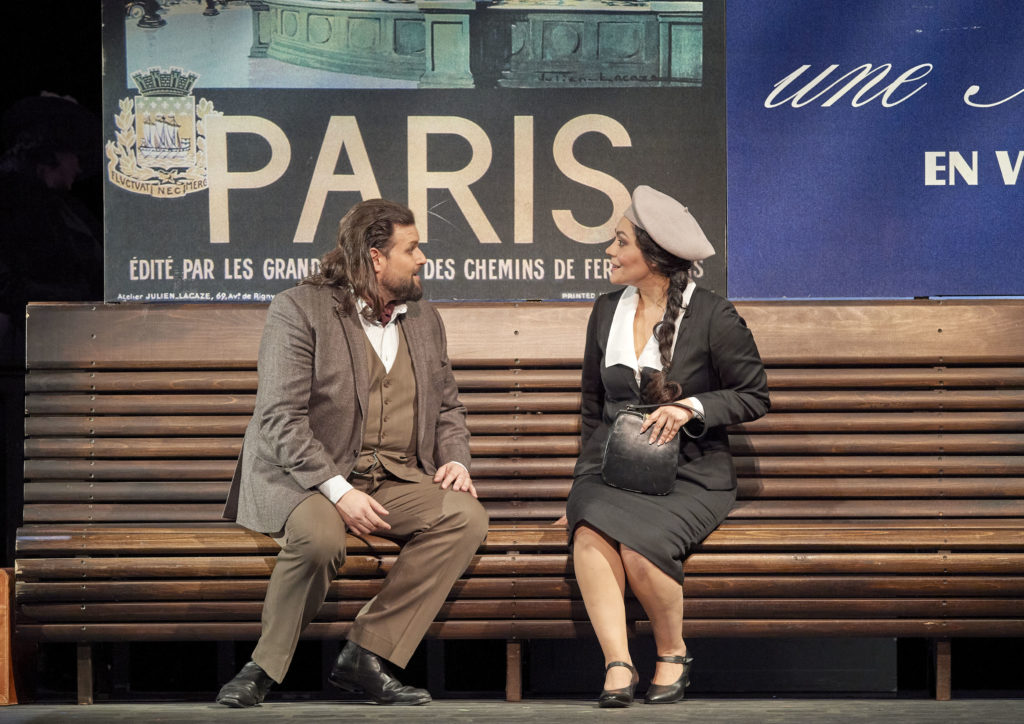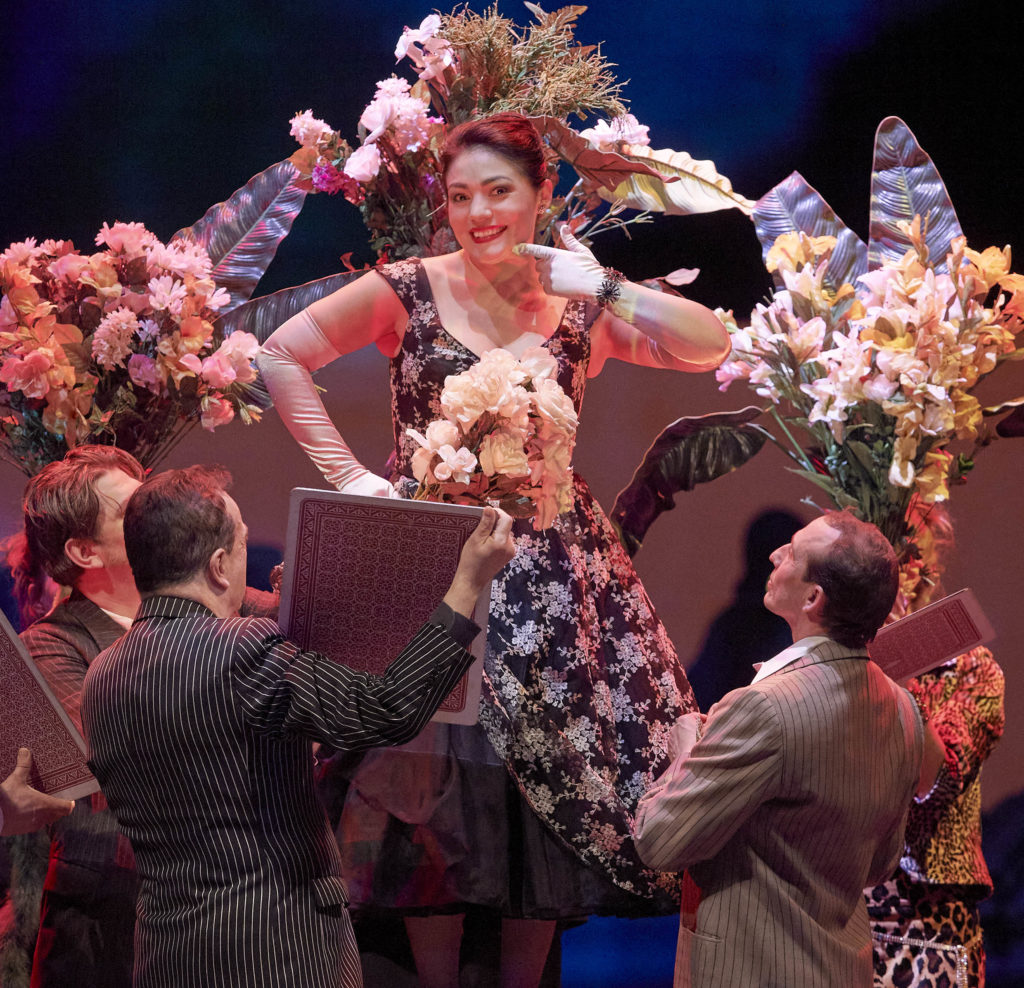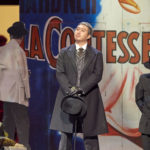 Massenet’s 1894 opera Manon was based on Abbé Prevost’s 18th Century novel (The Story of Chevalier de Grieux and Manon Lescaut.) Yet Andre Serban’s production is 20th Century. It begins in a ‘Victorian’ railway station. (But they ask, is this the inn where the coach to Arras stops?) Anyway, they’re all carrying modern suitcases. Sergeant Lescaut (Orhan Yildiz) is meeting his cousin Manon, who’s en route to a convent. They embrace very fondly. Soprano Ailyn Pérez’s Manon is very petite, but a mature lady, wearing a chic, black tailored costume. I’m still quite befuddled, dear cousin, she sings. This is the first journey she’s made, first journey ever, as she fingers her crucifix. Then, overwhelmed, ‘so sad, she wept.’ Pérez sings – with outstanding coloratura- of her sense of wonderment at this brave new world.
Massenet’s 1894 opera Manon was based on Abbé Prevost’s 18th Century novel (The Story of Chevalier de Grieux and Manon Lescaut.) Yet Andre Serban’s production is 20th Century. It begins in a ‘Victorian’ railway station. (But they ask, is this the inn where the coach to Arras stops?) Anyway, they’re all carrying modern suitcases. Sergeant Lescaut (Orhan Yildiz) is meeting his cousin Manon, who’s en route to a convent. They embrace very fondly. Soprano Ailyn Pérez’s Manon is very petite, but a mature lady, wearing a chic, black tailored costume. I’m still quite befuddled, dear cousin, she sings. This is the first journey she’s made, first journey ever, as she fingers her crucifix. Then, overwhelmed, ‘so sad, she wept.’ Pérez sings – with outstanding coloratura- of her sense of wonderment at this brave new world.
Yet, dramatically, it’s all very strange. She’s flirting with her cousin; even opens her jacket, showing her blouse. The character of Manon needs to develop from the would-be convent girl, from a quiet life, into the pleasure seeking, sensual woman. She falls in love; but, dissatisfied, needs money to indulge her extravagant needs. From the instrument of men to the modern feminist free-agent.
The man in the dark business suit is Guillot (Thomas Ebenstein), who closes in on her on the bench. Three ladies with him, dressed like tarts, wildly colourful, these ’18th century courtesans’- ‘prostitutes’ as in 20th. Lescaut orders Manon to behave; and slaps her bottom. ‘Don’t move from here!’ In Manon’s aria, she’ll abandon all those schemes, her dreams of the good life. But how beautiful those ladies are in their fine clothes.Be strong! Forget your desires!
This conflict between religious puritanism and lust for life underpins the opera. Chevalier de Grieux- who approaches her, embodies this conflict. He’s riddled with guilt at his feelings for her. Jean-François Borras, solemn, bearded, intellectual, perfectly inhabits this serious soul. Heaven, a dream: where do these feelings come from ? An iron hand drove him down; his life under his authoritarian father. Now he’s allured by an ‘enchantress’.
She sings of her privations. I am but a poor girl. Never done anything wrong! (We wonder.) This is the story of Manon Lescaut. He sings, the world should give you happiness. Happiness is her right. We shall have only joyful days in Paris, they sing. In their duet, Oh to enjoy oneself for a whole life long!
But the Paris apartment they elope to is spartan, introduced by Massenet’s enchanting love theme, with refined playing from Vienna State Opera orchestra under Frédérik Chaslin. While Perez poses in black underwear, Borras, other side of the stage, is at his desk. Writing. He’s pouring out his heart (to his father.) ‘Her name is Manon, and she’s sixteen.’ No other woman’s gaze has such tenderness, he exudes. Meanwhile she’s lying on their bed luring him; the coquette, she’s all over him.
Lescaut has tracked them down, commissioned by the wealthy Brétigny. At last, the loving couple! Do you intend to marry my cousin? Lescaut and his orderlies are jocular and boisterous. ‘Yesterday she turned 16. – Never!- I find her seductive, one sings. (But Grieux’s father has planned to abduct his son.)
As if sensing impending doom, Borras sings, What anguish. When will their happiness end. Manon knows Grieux’s to be abducted, yet sings, he’s the only one she loves. Poor Chevalier. Perez, confounding my earlier apprehensions, was enthralling in this pivotal aria. She’s not worthy of him, not good enough. Her way of saying, she wants a better life, the luxury she craves. He announces,’Dinner is served ‘, but ironically, they’ve only one glass.
Chevalier’s a dreamer, an idealist; he sings presciently, imagining their little cottage in the woods; but, en fermant les yeux, she’s not there. He opens the door to his kidnappers, she, complicit, yet grief-stricken. Brétigny (Clemens Unterreiner) arrives, waves pearls at her. She succumbs, and lies on her bed as if about to receive him.

From that claustrophobic apartment, to the Paris of her dreams. La Pigalle, the Rue-Saint-Denis (stage set Peter Pabst), Paris of the 1930’s, claims director Serban. But the giant poster is of a Bogart film, and the limos seem 1950’s. But anyway the excitement of La Vie parisienne is there, stage bustling with all social levels- from sex-workers, underworld spivs, to butchers at their stalls, serving well-heeled pleasure seekers.
Pérez’s Manon sings, feisty, defiant, the high and mighty take their hats off to me: I am beautiful and happy, her coloratura ascending bird-like. As long as your beauty lasts, seize your days, Profitons bien de la jeunesse: life’s too short. Terrific number belted out by Pérez – a diminutive, gutsy, Piaf figure. But she turns to an older man, a true gentleman must be a poet.
The Act4 in St.Sulpice monastery obviously shows De Grieux’s serious side; also Massenet’s dramatic mastery in contrasting scenes and moods: the solemn liturgical, after the dazzling neon glamour of Paris. Borras/Grieux sings, he’s found bitterness and revulsion in life. He’s visited by his father Count Grieux (a far too young-looking, but sonorous bass Jongmin Park), who opines that his son marry a nice girl:’virtue for show is no virtue.’ He even tries to buy Chevalier off. But Borras sings he’s devoted to only one God, and of being betrayed: a bitter chalice. Borras’s tenor impressively powerful, but not overdone.
But Borras sings he’s devoted to only one God, and of being betrayed: a bitter chalice. Borras’s tenor impressively powerful, but not overdone.
Manon sneaks into the cloister, Pérez wearing a sleeveless black designer dress, haute couture. She supplicates herself to ask for God’s mercy. He’s outraged. Leave this place! She hangs onto his cassock: he thinks he’d banished her from his dreams. But Pérez’s’s Manon is some temptress, She flaunts herself over the leather couch. Is this no longer the voice once devoted to you? – He, Oh, God, help me in my hour of need! Terrific duet; sensational performances. She’s got her man back.
Now an illicit gambling club (Hôtel de Transylvanie.) A speakeasy! Fabulous set. Card tables in overview. Front stage, three broads, those from Act1, perched on the bar. There’s a knife fight, in the authentic atmosphere, thick with menace. Manon descends, Pérez in a shimmering silver evening gown, with a huge slit, revealing- as she opens her legs- her g-string. She climbs onto the bar.
Lescaut initiates Chevalier in gambling technique. Wildly misguided, he’s determined to afford Manon’s luxurious lifestyle. Manon, you astonishing sphinx, you siren, exclaims Borras. She sings, NEVER DOUBT MY LOVE! (Fatefully, Guillot arrives, in a sharp white jacket.)
Then Manon sings, ascending to the top of the bar, May love and roses be ours: who knows whether we’ll be alive tomorrow.And she raises a toast, MORE MONEY!
Guillot loses to Grieux. Guillot’s revenge: the police called in, Chevalier arrested for cheating, but exonerated from the scandal by his father’s intervention, in a breathtakingly choreographed ensemble. THE GUARD WILL TAKE HER TO WHERE PEOPLE LIKE HER BELONG, Guillot charges Manon.
A line up of ‘those women’, chained together for deportation; Chevalier’s rescue bid fails. In their reunion, Pérez lies head down, hidden with shame. ‘We’ll escape together, my one and only love’, he promises. Nevertheless, Manon begs forgiveness! Pérez, poignantly, can’t conceive why she could have caused him pain. Manon ‘both fickle and shallow’, from virtue to hedonism, is irresistibly endearing.
Collapsed, she feels a flame, (like Violetta’s resurrection in Traviata). Happy days lie ahead of us! He forgives her. Backstage, undulating greys and blues, a silver moon in mist. She slumps in his arms. ‘And that is the story of Manon Lescaut.’ Massenet’s Manon remains one of the great 19th century French operas. Serban’s modern reworking, for all its inauthentic detail, has made this story recognisable to new audiences. PR.7.3.2020
Photos: Jean-Francois Borras (Chevalier Des Grieux), Ailyn Pérez (Manon Lescaut); Orhan Yildiz (Lescaut); Ailyn Pérez (Manon); Jongmin Park (Count Grieux)
© Wiener Staatsoper/ Michael Pöhn
